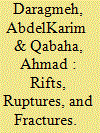|
|
|
Sort Order |
|
|
|
Items / Page
|
|
|
|
|
|
|
| Srl | Item |
| 1 |
ID:
173128


|
|
|
|
|
| Summary/Abstract |
The discourse on migration and refugee studies continues to be framed around two main principles: sovereignty and identity. In contemporary politics, however, the refugee subject is defined and managed from a universal framework where the language of rights elevates the potency of liberalism as both a discourse and an instrument of domination. This article examines refugeehood from a framework that transcends the sovereignty/identity dichotomy. It offers a more nuanced contextual approach through which this mass socio-political phenomenon can be better understood. To validate the article's new methodology, it sets out to examine the Palestinian refugee question, the oldest unresolved refugee problem in the history of the modern Middle East. The article makes visible the performative role of question framing by giving particular attention to historical transfigurations in the conceptualization of the people's right to self-determination. As a discourse-based analysis, the article demonstrates how current discursive formations produce colonial knowledge that can facilitate the development of new social and political tools of population control. The article concludes by showing how conceptual transfiguration of the right to self-determination incited the orientalist scholarship on the Palestinian refugee question in the interest of legitimizing and normalizing Israel as a Western colonial establishment.
|
|
|
|
|
|
|
|
|
|
|
|
|
|
|
|
| 2 |
ID:
173126


|
|
|
|
|
| Summary/Abstract |
This article responds to the relative neglect of reading Mahmoud Darwish from a postmodern perspective. Inspired by postmodern theory, we suggest that Darwish after Oslo agreements in 1993 seeks to have a displaced and dialectical encounter with the collective identity; he utilizes a transition from being into becoming, from filiation into affiliation, knowing that this transition mirrors rifts, ruptures, and fractures in the Palestinian historical and geopolitical conditions in the post-Oslo era. By looking at poems written after the Oslo Accords, which were described by Bashir Abu-Manneh as “the root cause of the disintegration and liquidation of Palestinian agency,” we argue that Darwish's persona manifests the postmodern intellectual who is tempted to leave the collective and expatriate himself to hone an independent self and thought that provides a fresh perspective and a new understanding of Palestinian collectivity. While Darwish's pre-Oslo poetry expressed a collective voice, identification, and commitment to the national narrative, after Oslo, he gets more personal and, perhaps, detached from and critical of the nationalist political entities and narratives. Building on theoretical insights from both postcolonial and postmodern intellectuals, we also articulate ways in which the dialectical relation between postcolonialism and postmodernism appears in Darwish's poetry. We find that the persona at times combines, and at other times, fluctuates between, singularity and multiplicity, certainty and suspicion, the collective and the personal, place and space, tradition and innovation, while seeking revision, transition, contingency, dynamism, fluidity in the contemporary, post-Oslo time.
|
|
|
|
|
|
|
|
|
|
|
|
|
|
|
|
| 3 |
ID:
173127


|
|
|
|
|
| Summary/Abstract |
On April 5, 2018 Saudi Arabia announced the Salwa Canal project to inaugurate a new generation of shipping canals that has nothing to do with advancing maritime navigation, but rather for changing Qatar's geography and isolating it. If executed as planned, the Salwa Canal would be built completely on Saudi territory 1 km from its border with the Qatar peninsula. The latter would see its only land border disappear and turn the State of Qatar into an island State. The following questions arise: insofar as international law is concerned, would Saudi Arabia be within its rights to execute this project? Would Qatar have a legal case in international forums to halt the project on grounds that its geography would be adversely impacted? On another level, would Qatar, as the injured State, be able to refer the matter to the International Court of Justice to discuss possible environmental damage? What impacts does this project, if executed, have on other possible cases such as Malaysia, should Thailand decide to construct a canal that would connect the province of Satun with the gulf of Thailand and Songkhla province to directly access the Strait of Malacca, or on the claimed city of Gibraltar, if Spain decides to connect the Bay of Algeciras with the Alboran Sea via a sea canal? This article attempts to shed some light on such novel matters in light of the Salwa Canal project and its legal impacts under international law.
|
|
|
|
|
|
|
|
|
|
|
|
|
|
|
|
|
|
|
|
|